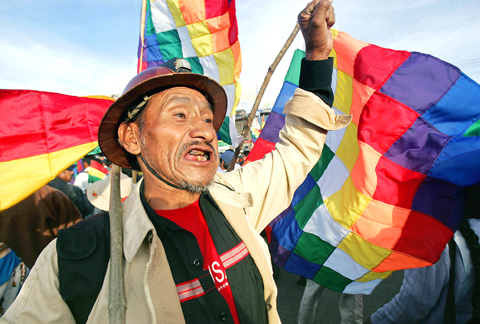The Organization of American States (OAS) late on Friday expressed support for Bolivia’s territorial integrity ahead of an autonomy referendum
In a resolution, the OAS Permanent Council rejected “any attempts to disrupt” Bolivia’s constitutional order and its territorial integrity. It also urged all those involved in the political process “to avoid any action that could undermine peace, constitutional order and peaceful coexistence among Bolivians.”
Bolivia is bracing for a weekend vote on autonomy in the province of Santa Cruz that many fear could send the Latin American nation into violent turmoil.

PHOTO : AFP
Local authorities in Santa Cruz, which counts as the wealthiest of Bolivia’s nine provinces because of its gas riches, are expected to win overwhelming backing in the referendum.
If it is passed, they plan to implement statutes giving them greater control over the region’s finances and the right to create their own security force.
But leftwing Bolivian President Evo Morales has vowed to ignore such a result, calling it unconstitutional and separatist.
Although he has backed away from an early threat to send in troops, the specter of street violence between his supporters and backers of Santa Cruz autonomy looms large.
On Friday, 5,000 indigenous Indians held a march through Santa Cruz, the main city of the province with the same name, to protest against the regional referendum seeking greater independence from the national government.
Recent polls suggest as much as 70 percent of the province’s 900,000 voters will back the move to autonomy.
OAS Secretary General Jose Miguel Insulza said members of the organization were “fundamentally preoccupied” with the course of events in Bolivia.
“We want to preserve national unity in the country, its democracy and avoid violence,” Insulza told reporters ahead of the vote of the resolution.
Meanwhile, Bolivian Foreign Minister David Choquehuanca decried what he described as a refusal by Santa Cruz leaders to maintain dialogue with the central government.
“We thought they would listen to appeals by the OAS, the Catholic Church and the international community,” he said. “But that was not the case.”
Morales, the country’s first indigenous president and an admirer of Venezuela’s leftist President Hugo Chavez, has embarked on a socialist agenda that has raised hackles in Santa Cruz and other areas with big landowners.
With a defiant tone, he sent police and soldiers this week to Santa Cruz to seize the offices of a telecommunications company, Entel, a subsidiary of Telecom Italia, that he nationalized by decree.
Four energy firms operating in Bolivia were also declared to be under the control of the state.
Today’s referendum is mostly a reaction to Morales’ determined push to revise the constitution to give more power and wealth to the indigenous population.
The measures include limiting the size of land in private hands and distributing more money from Bolivia’s vast gas fields.
Morales’s tactic of railroading through the proposed amendments, and his refusal to negotiate, has fueled much of the resentment that gave rise to the autonomy campaign in Santa Cruz and elsewhere.
Three other neighboring provinces are to hold their own autonomy votes next month, and two others are thinking of following suit.

POLITICAL PRISONERS VS DEPORTEES: Venezuela’s prosecutor’s office slammed the call by El Salvador’s leader, accusing him of crimes against humanity Salvadoran President Nayib Bukele on Sunday proposed carrying out a prisoner swap with Venezuela, suggesting he would exchange Venezuelan deportees from the US his government has kept imprisoned for what he called “political prisoners” in Venezuela. In a post on X, directed at Venezuelan President Nicolas Maduro, Bukele listed off a number of family members of high-level opposition figures in Venezuela, journalists and activists detained during the South American government’s electoral crackdown last year. “The only reason they are imprisoned is for having opposed you and your electoral fraud,” he wrote to Maduro. “However, I want to propose a humanitarian agreement that

ECONOMIC WORRIES: The ruling PAP faces voters amid concerns that the city-state faces the possibility of a recession and job losses amid Washington’s tariffs Singapore yesterday finalized contestants for its general election on Saturday next week, with the ruling People’s Action Party (PAP) fielding 32 new candidates in the biggest refresh of the party that has ruled the city-state since independence in 1965. The move follows a pledge by Singaporean Prime Minister Lawrence Wong (黃循財), who took office last year and assumed the PAP leadership, to “bring in new blood, new ideas and new energy” to steer the country of 6 million people. His latest shake-up beats that of predecessors Lee Hsien Loong (李顯龍) and Goh Chok Tong (吳作棟), who replaced 24 and 11 politicians respectively

Young women standing idly around a park in Tokyo’s west suggest that a giant statue of Godzilla is not the only attraction for a record number of foreign tourists. Their faces lit by the cold glow of their phones, the women lining Okubo Park are evidence that sex tourism has developed as a dark flipside to the bustling Kabukicho nightlife district. Increasing numbers of foreign men are flocking to the area after seeing videos on social media. One of the women said that the area near Kabukicho, where Godzilla rumbles and belches smoke atop a cinema, has become a “real

‘WATER WARFARE’: A Pakistani official called India’s suspension of a 65-year-old treaty on the sharing of waters from the Indus River ‘a cowardly, illegal move’ Pakistan yesterday canceled visas for Indian nationals, closed its airspace for all Indian-owned or operated airlines, and suspended all trade with India, including to and from any third country. The retaliatory measures follow India’s decision to suspend visas for Pakistani nationals in the aftermath of a deadly attack by shooters in Kashmir that killed 26 people, mostly tourists. The rare attack on civilians shocked and outraged India and prompted calls for action against their country’s archenemy, Pakistan. New Delhi did not publicly produce evidence connecting the attack to its neighbor, but said it had “cross-border” links to Pakistan. Pakistan denied any connection to